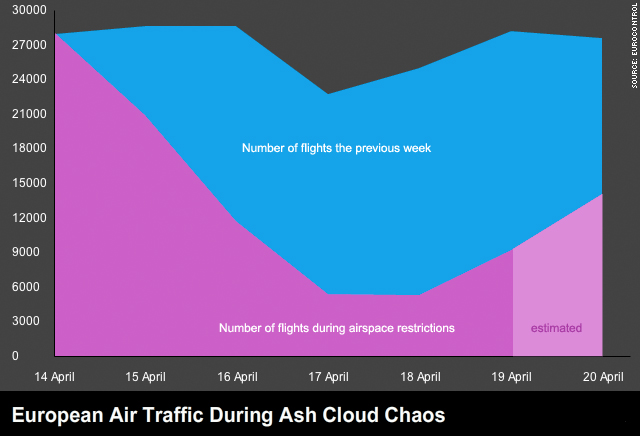Air safety officials defend ash cloud flight ban

- Aviation officials raise ash density threshold deemed dangerous to flights
- Airlines facing heavy losses say shutdown of airspace was unnecessary
- Aviation officials say they acted according to existing ash cloud guidelines
- Officials deny they were "bullied" by airlines into changing the rules
London, England (CNN) -- Aviation safety officials in Europe have defended the decision to close parts of the continent's airspace for six days in the face of claims by the airline industry that the shutdown was unnecessary.
The UK, home to the world's busiest international airport at London Heathrow, was among the last European countries to reopen its airspace Tuesday as safety concerns over the ash cloud caused by an Icelandic volcano eased.
That followed the issue of new guidelines by the UK's Civil Aviation Authority (CAA) raising the threshold of ash density in the atmosphere at which flying is deemed safe from zero to 0.002 grams per meter cubed per hour.
It said new data collected from test flights and additional analysis from manufacturers over the past few days had "helped to validate a new standard that is now being adopted across Europe."
But the CAA move prompted criticism on the one hand that safety officials had been overcautious and on the other that they had been "bullied" by an industry facing massive losses.
British Airways CEO Willie Walsh said earlier in the week that test flights carried out by airlines including BA had demonstrated that the ash cloud posed little risk to air travel.
"The analysis we have done so far, alongside that from other airlines' trial flights, provides fresh evidence that the current blanket restrictions on airspace are unnecessary," Walsh said.
 Video: Volcano expert: Good sign worst is over
Video: Volcano expert: Good sign worst is over
 Explainer: How ash affects aircraft engines
Explainer: How ash affects aircraft engines
 Flight cancellations
Flight cancellations
The International Air Transport Association (IATA) also questioned the closure of European skies on Wednesday, claiming that the disruption, which it said had "eclipsed 9/11," had cost airlines $1.7 billion in lost revenue.
Air travel disruption: latest developments
"Airspace was being closed based on theoretical models not on facts," said IATA Director General and CEO Giovanni Bisignani. "Test flights by our members showed that the models were wrong. Our top priority is safety. Without compromising on safety, Europe needed to find a way to make decisions based on facts and risk assessment, not theories."
But Alex Bristol, a spokesman for the UK's national air traffic controller NATS, told CNN that safety officials had acted in accordance with existing safety regulations.
"The decisions made were the right ones and we absolutely stand by those," said Bristol.
"The primary concern for all involved... has been to ensure flight safety. Until we got some scientific proof that it was safe to fly under different regulations -- which the CAA published yesterday evening -- we had to restrict the air space and we did the right thing."
He warned that air space restrictions remained in place over northwest Scotland and the Western Isles and said that British airspace could be affected again if ash in the atmosphere reached dangerous densities.
Battle to clear backlog as Europe reopens for flights
"However, at this moment of time, with the longer term Met Office weather forecasts and the conditions that we're seeing from the volcano, at this stage that looks less likely," he said.
A spokesman for the CAA conceded that if the 0.002 grams per meter cubed per hour threshold had been in place earlier the total closure of airspace over the UK and elsewhere would not have been necessary.
"Certain areas certainly would have been able to remain open but areas of higher concentration would have remained closed," he said.
He said that it had been necessary to keep airspace over the UK closed for longer than airspace over mainland Europe because it was nearer to the volcano and experiencing higher concentrations of ash.
But he said the ash cloud situation had provided an "unprecedented" opportunity to test the effects of volcanic ash on jet engines.
"We're now at a situation where (engine manufacturers) know what their engines can cope with," he said. "It's something that shouldn't happen again because now we know what we're dealing with."
The head of the CAA, Andrew Haines, denied Wednesday that the organization had been bullied by the airlines into revising its safety standards.
"The airlines know that their safety record is a fundamental lynchpin of their operation. The UK has one of the finest safety records in the world and there was no way they were going to compromise that and there was no way we would have allowed it," Haines told GMTV.
"What we've done over the last few days is work with international experts to establish whether or not a better guideline could be put into place, and that is what we've been able to do."
British transport minister Andrew Adonis also denied that the government and the CAA had been pressured by the airlines.
"They have not been based on pressure from airlines, and that is what the public would expect," Adonis told GMTV.
The International Civil Aviation Organisation (ICAO), a United Nations body regulating aviation safety, said the ash cloud disruption had highlighted the need for a new safety framework.
"In light of the unprecedented disruptions to air traffic, it is clear that more effort needs to be undertaken to establish a global safety risk framework for routinely determining safe levels of operation in airspace contaminated by volcanic ash," it said in a statement.
"ICAO invites states, the scientific community, aviation safety professionals, manufacturers, airports and airlines to provide valuable input to the development of such a framework."







